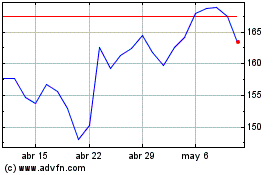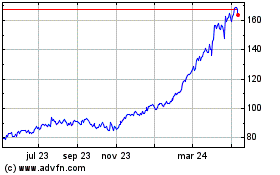GE Hit by Steep Decline in Jet-Engine Business--2nd Update
29 Julio 2020 - 7:58AM
Noticias Dow Jones
By Thomas Gryta
General Electric Co. posted a roughly $2 billion quarterly loss
as revenue tumbled 24%, hurt by a steep decline in a jet-engine
business that has been hobbled by the coronavirus pandemic.
The aviation business, once a profit engine for GE, swung to a
loss in the June quarter as both revenue and orders plunged. The
unit produces engines for Boeing Co. and Airbus SE planes but has
had to cut production and jobs as airlines delay orders. On
Wednesday, Boeing said it would cut further production of
commercial jets.
GE reported it burned through less cash in the June quarter than
it had previously warned. The company reported adjusted negative
cash flow from industrial operations of $2.1 billion, compared with
its projection of negative $3.5 billion to $4.5 billion in May.
Analysts were expecting negative cash flow of $3.29 billion,
according to FactSet.
"We're working through a still-difficult Covid-19 environment,"
said CEO Larry Culp, adding that he still expected a prolonged
recovery for the commercial-aviation business. "Still, based on
what we see today and the actions we've taken, sequential
improvement in earnings and cash in the second half of the year is
achievable."
GE also said it expects a return to positive cash flow in 2021.
The measure is closely watched by investors after troubles in
generating cash forced the company to slash its dividend and sell
off business units. In May, it sold off its century-old GE Lighting
unit, its last link to consumers.
In an interview, Mr. Culp said there was improvement over the
months of the quarter, citing an upturn in airplane departures and
increased use of GE's health-care scanning equipment. He said the
company's manufacturing facilities and service groups have returned
to "nearly full capacity" since early in the quarter. But
uncertainty about the broader economy and the pandemic remains.
"Covid, in terms of the data, trends and how governments and the
public will react as we get into the fall is the wild card for most
every company out there," he said.
The conglomerate has been revamping itself under Mr. Culp with a
focus on cutting debt and generating more cash but has been hit
hard by the coronavirus crisis, leading it to pull its full-year
financial outlook in April. GE is on track to cut more than $2
billion in costs in 2020, and Mr. Culp wouldn't rule out additional
job losses.
"We want to be realistic that this is an incredibly challenging
environment," he said. "That was true in the second quarter and it
will be true as we move forward, so we are going to continue to
look for opportunities to reduce costs and preserve cash."
On Wednesday, GE said it planned to sell its remaining stake in
oil-and-gas company Baker Hughes over three years. GE said it has
cut its debt by $9.1 billion this year and had $41 billion in cash
at the end of June.
Profits and sales declined from a year ago across GE's main
operating units. Revenue fell 44% at the aviation unit, 3% in
renewable energy and 11% in its power segment, which makes turbines
for power plants. All three posted operating losses. Revenue fell
21% in its health-care unit, which makes hospital equipment and was
the only industrial unit to generate an operating profit.
Overall, GE posted a net loss attributable to common
shareholders of $2.18 billion, compared with a loss of $61 million
a year ago. Revenue was $17.75 billion. The year-ago results
include GE's biopharma business, which it sold earlier this year,
and its former controlling stake in Baker Hughes.
GE booked more than $2.3 billion in charges in the latest
quarter, writing down the value of several assets, including its
industrial 3-D printing business, its GE Capital jet-leasing
business and some long-term service contracts. The charges were
partly offset by investment gains on its Baker Hughes stake.
Excluding items, GE reported an adjusted loss of 15 cents a
share, compared with Wall Street's estimate of a 10-cent-a-share
loss.
The aviation business was GE's biggest and most profitable in
recent years as it benefited from a booming aerospace market and
investments, including the launch of GE's most advanced engine to
power Boeing Co.'s MAX jet. But with the MAX grounded and airlines
canceling flights, GE said quarterly orders for new equipment fell
41% and for services fell 67% from a year ago.
American Airlines Group Inc. and Southwest Airlines Co. this
month said they were tempering expectations for an air-travel
recovery, as the pandemic surges in parts of the U.S.
GE, which started the year with about 205,000 workers, has
already announced plans to cut a quarter of its aviation unit,
which had 52,000 employees. The company said it cut 5,400 aviation
workers in the quarter.
GE shares were little changed in premarket trading Wednesday, up
11 cents to $7.01. Since the start of the year, the shares had
fallen about 40%. The stock tumbled in 2017 and 2018 after GE
disclosed deep problems in its power unit and capital arm that
forced it to slash its dividend and sell off business. GE hired Mr.
Culp as CEO in October 2018 and he had made progress in
streamlining operations before the pandemic hit.
Write to Thomas Gryta at thomas.gryta@wsj.com
(END) Dow Jones Newswires
July 29, 2020 08:43 ET (12:43 GMT)
Copyright (c) 2020 Dow Jones & Company, Inc.
GE Aerospace (NYSE:GE)
Gráfica de Acción Histórica
De Mar 2024 a Abr 2024

GE Aerospace (NYSE:GE)
Gráfica de Acción Histórica
De Abr 2023 a Abr 2024
